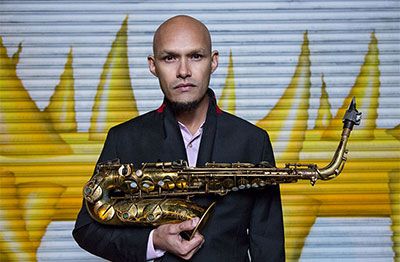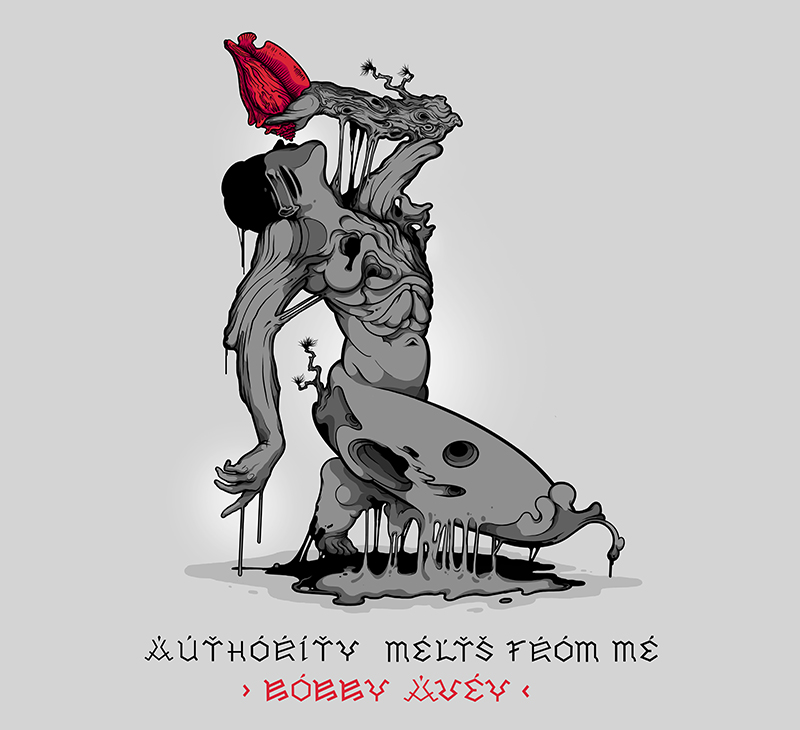“This young musician and composer is at once reestablishing the artistic, cultural, and social tradition of jazz while creating an entirely new jazz language for the 21st century.”
— MacArthur Foundation, 2008.
Multiple Grammy Nominee, Guggenheim and MacArthur Fellow Miguel Zenón represents a select group of musicians who have masterfully balanced and blended the often-contradictory poles of innovation and tradition. Widely considered as one of the most groundbreaking and influential saxophonists of his generation, he has also developed a unique voice as a composer and as a conceptualist, concentrating his efforts on perfecting a fine mix between Latin American Folkloric Music and Jazz.
His latest release, Típico (Miel Music, 2017) celebrates the Miguel Zenón Quartet, his working band of more than 15 years, which includes Venezuelan pianist Luis Perdomo, Austrian bassist Hans Glawischnig and fellow Puerto Rican drummer Henry Cole. The album features original music by Zenón, which was specifically written for the members of the Quartet and directly inspired by their individual playing and personalities. The end result is a testament to the band’s unique chemistry and their outstanding collective musicianship. Típico was praised as one the Best Jazz Albums of 2017 by NPR, The Chicago Tribune, The Boston Globe, Jazz Times and many others . It also received a Grammy and Latin Grammy Nomination for Best Latin Jazz Album.
Born and raised in San Juan, Puerto Rico, Zenón studied classical saxophone at the Escuela Libre de Música in Puerto Rico before receiving a bachelor’s degree in Jazz Studies from Berklee College of Music, and a master’s degree in Jazz Performance at Manhattan School of Music. Zenón’s more formal studies, however, are supplemented and enhanced by his vast and diverse experience as a sideman and collaborator. Throughout his career he has divided his time equally between working with older jazz masters and working with the music’s younger innovators –irrespective of styles and genres. The list of musicians Zenón has toured and/or recorded with includes: Charlie Haden, Fred Hersch, Kenny Werner, David Sánchez, Danilo Perez, The Village Vanguard Orchestra, Guillermo Klein & Los Guachos, The Jeff Ballard Trio, Antonio Sanchez, David Gilmore, Paoli Mejias, Brian Lynch, Jason Lindner, Miles Okazaki, Ray Barreto, Andy Montañez, Jerry Gonzalez & The Fort Apache Band, The Mingus Big Band, Bobby Hutcherson and Steve Coleman.
He is also a founding member of the groundbreaking SFJAZZ Collective, a group whose past and current members include Bobby Hutcherson, Joe Lovano, Joshua Redman, Brian Blade, Nicholas Payton, Dave Douglas, and Eric Harland. In 2012, Zenón’s association with SFJAZZ expanded even further, when he served as resident artistic director for the first two seasons of the SFJAZZ Center, along with Bill Frisell, Jason Moran, Regina Carter and John Santos.
Zenón’s ten recordings as a leader (including the above mentioned Típico) represent not only his growth as a musician, but also his ability to constantly evolve and reinvent himself as a conceptualist and producer.
His debut CD, Looking Forward (Fresh Sound New Talent, 2002), represents a snapshot of the very eclectic musical interests of the then 24-year-old musician, and was selected by the New York Times as the number one “alternative” jazz recording of 2002.
His second recording as a leader, Ceremonial (Marsalis Music, 2004), was described by All About Jazz as a “ head on crash of Latin, Jazz and Classical traditions–modern Jazz at it’s very best, ” and garnered unanimous critical praise and recognition both within and outside the jazz world.
Jíbaro (Marsalis Music, 2005), his third recording, was further proof that all the critical praise he had been receiving was well deserved. The recording is an exploration of a style of popular Puerto Rican folk music known as La Música Jíbara. The Chicago Tribune summed it up best when they wrote: “The instrumental prowess of Zenon’s playing, the vigor of his compositions and the sensitivity of his band to Puerto Rican song forms point to new possibilities in jazz.” Like his previous recordings, Jíbaro was uniformly well received and appeared on many top ten lists including The New York Times, Latin Beat, El Nuevo Día, and the Chicago Tribune.
Decidedly more personal and introspective, Awake (Marsalis Music, 2008) incorporates a string quartet and additional horns to Zenón’s core group and brings to the forefront his formidable skills as a writer and arranger. As was admirably put in Audiophile Audition: “ This is an album far beyond the usual sax & string outing, revealing a unique statement that communicates passion, intellect and spirit to the listener.” Awake also caught the attention of the international press, garnering it 5 star reviews and top honors in publications like Jazzwise (UK), Jazz Man (France) and Jazz Magazine (France).
Zenón returned to his Puerto Rican roots for inspiration in his next outing, Esta Plena (Marsalis Music, 2009), which draws from the traditional Plena music style of his home country and was supported by a fellowship from the prestigious John Simon Guggenheim Foundation. On it Zenón augmented his quartet to include three percussionists/vocalists and took on the additional roles of both lyricist and vocalist. Jazz Times wrote that Esta Plena is “…music with integrity, energy, poise and a fresh vision of how the Afro-Caribbean jazz aesthetic can evolve without losing its deep roots.” In addition to being hailed by critics (New York Times, Village Voice, El Nuevo Día , Downbeat, The Chicago Tribune ) as one of the best recordings of 2009, the recording earned Zenón two Grammy nominations (one for Best Improvised solo and one for Best Latin Jazz Recording of the year) as well as a Latin Grammy nomination for Best Latin Jazz Recording of the year.
Alma Adentro (Marsalis Music, 2011), is a tribute to The Puerto Rican Songbook. On it he arranges and explores the music of five legendary Puerto Rican composers: Bobby Capó, Tite Curet Alonso, Pedro Flores, Rafael Hernández, and Sylvia Rexach (whom he considers “the George Gershwins, Cole Porters and Jerome Kerns of Puerto Rican song”). The recording features his longtime working quartet of pianist Luis Perdomo, bassist Hans Glawischnig and drummer Henry Cole, plus a ten-piece woodwind ensemble orchestrated and conducted by close friend and collaborator Guillermo Klein. This groundbreaking project both honors the music of these masters while at the same time exposing their music to new audiences. Alma Adentro was chosen as the Best Jazz Recording of 2011 by iTunes and NPR, and was Nominated for a 2012 Grammy Award for Best Large Jazz Ensemble Album and a 2012 Latin Grammy for Best Instrumental Album.
Rayuela (Sunnyside Records 2012), is a collaboration with french pianist/composer Laurent Coq. It was inspired by the literary masterpiece of the same name by argentinean writer Julio Cortázar (Hopscotch in english) and the compositions on the recording look to translate some of the most memorable characters and passages from the book into musical terms. They are joined by Dana Leong (cello and trombone) and Dan Weiss (tabla, drums and percussion), masterful musicians who help create the unique ensemble sound that distinguishes this very special project.
Oye!!! Live in Puerto Rico (Miel Music, 2013) features the debut recording of The Rhythm Collective, an ensemble first put together in 2003 for a month long tour of West Africa. The group includes Aldemar Valentín on Electric Bass, Tony Escapa on Drums and Reinaldo de Jesus on percussion; all native Puerto Ricans and some of the most coveted musicians in their respective fields. Fed by the energy of the full capacity audience in attendance, the group delivers a high intensity performance which includes originals by Zenon and covers of Tito Puente’s “Oye Como Va” and Silvio Rodriguez’ “El Necio”.
Identities are Changeable (Miel Music, 2014) is inspired by the idea of national identity as experienced by the Puerto Rican community in the United States, specifically in the New York area. All the music on the album is written around a series of interviews with several individuals, all of them New Yorkers of Puerto Rican descent. The narrative created by these conversations gave birth to all the compositions on the record, with audio excerpts from the interviews weaving in and out each piece. The album, which is also complemented by a video installment by David Dempewolf, features Zenón’s longstanding quartet (with Luis Perdomo, Hans Glawischnig and Henry Cole) plus a twelve-piece large ensemble comprised of some of the best musicians in jazz today. Identities Are Changeable was Nominated for a Grammy Award for Best Latin Jazz Album and chosen as one of the best recordings of 2014 by NBC News, NPR, The Boston Globe, Rhapsody, All About Jazz and Jazz News Magazine, among others.
As a composer he has been commissioned by SFJAZZ, The New York State Council for the Arts, Chamber Music America, Logan Center for The Arts, The Hyde Park Jazz Festival, The John Simon Guggenheim Foundation, MIT, Jazz Reach, Peak Performances, PRISM Quartet and many of his peers.
He has been featured in publications such as The New York Times, The Wall Street Journal, The Los Angeles Times, The Chicago Tribune, Bloomberg Pursuits, Jazz Times, Jazziz, Boston Globe, Billboard, Jazz Inside, Newsday, Details, as well as gracing the cover of Downbeat Magazine on two occasions (2010 & 2014). He has also topped the Rising Star Alto Sax category of the Downbeat Critic’s Poll on four different occasions, topped both the Jazz Artist of the Year and Alto Saxophonist of the Year categories on the 2014 Jazz Times Critics Poll and was selected as the 2015 Alto Saxophonist of the Year by the Jazz Journalist Association.
Zenon’s biography would not be complete without discussing his role as an educator. In 2003, he was chosen by the Kennedy Center to teach and perform in West Africa as part of their Jazz Ambassador program. Since then, he has given hundreds of lectures and master classes and has taught all over the world at institutions which include: The Banff Centre, Berklee College of Music, Siena Jazz, Universidad Veracruzana, Conservatorium Van Amsterdam, Musik Akademie Basel, Conservatoire de Paris, University of Manitoba, Manhattan School of Music, Columbia University, Princeton University, UMass-Amherst and the Brubeck Institute. He is also a permanent faculty member at New England Conservatory of Music. But perhaps what best reflects his commitment to education and cements his growing reputation as a “cultural ambassador”, is a program that he founded in 2011, called Caravana Cultural.
The main purpose of Caravana Cultural is to present free-of-charge Jazz concerts in rural areas of Puerto Rico. The program makes a “cultural investment” in the Island by giving these communities a chance to listen to jazz of the highest caliber (Zenón invites some of the best musicians in the New York jazz scene to perform as guests), while at the same time getting young Puerto Rican musicians actively involved in the concert activities. Since February 2011, Zenón has presented a concert every four to six months. Each concert focuses on the music of a specific jazz legend (Charlie Parker, Miles Davis, Duke Ellington, among others) and is preceded by a pre-concert presentation which touches on the basic elements of jazz and improvisation. Since 2005 Zenón has also personally organized “Jazz Jam Sessions” in the area of San Juan, as a way of creating a platform for younger jazz musicians to grow and interact with one another.
In 2008 he was selected as one of 25 distinguished individuals to receive the prestigious and coveted MacArthur Fellowship, more commonly known as the “Genius Grant”.
Zenón lives in New York City with his wife Elga and their daughter.





